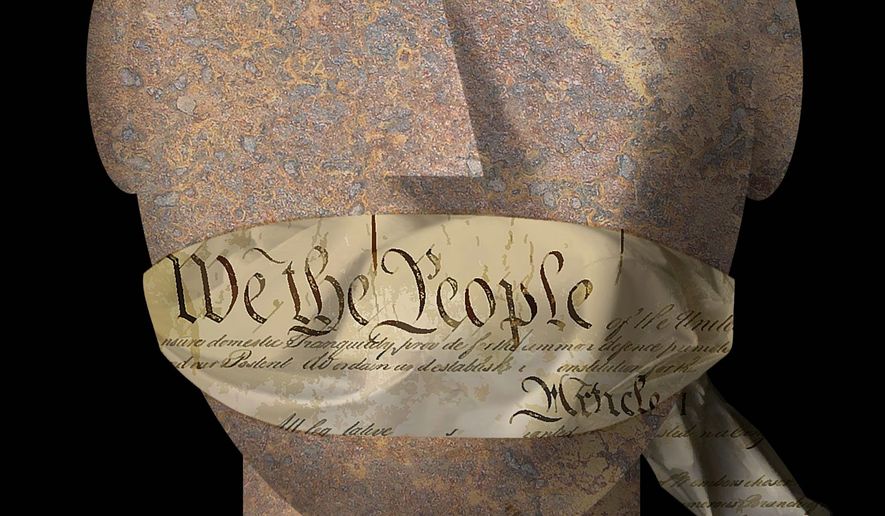OPINION:
“Congress shall make no law … abridging the freedom of speech, or of the press.” — First Amendment to the U.S. Constitution
When James Madison agreed to be the scrivener at the Constitutional Convention in the summer of 1787, he could not have known that he’d be the chairman of the House of Representatives committee drafting the Bill of Rights just four years later.
In doing so, he insisted that the word “the” precede the phrase “freedom of speech” in what was to become the First Amendment to reflect the framers’ views that the freedom of speech preexisted the government.
Madison believed that pre-political rights, which he enumerated in the Bill of Rights, are natural to our humanity. Madison knew that when he wrote, “Congress shall make no law … abridging the freedom of speech, or of the press,” he and the ratifiers meant no law. As direct and unambiguous as those words are — the Constitution as amended is the supreme law of the land — Congress and the courts have not always been faithful to them.
The first serious federal attack on free speech came in the Alien and Sedition Acts of 1798, which criminalized criticisms of the federal government’s foreign policy and President John Adams’ administration. The same generation — in some cases, the same men — who had ratified the First Amendment in 1791 assaulted, defied and nullified it seven years later.
In response to the Alien and Sedition Acts, the two most prominent thinkers in America — Thomas Jefferson, who had written the Declaration of Independence, and Madison — secretly wrote the Virginia and Kentucky resolutions, respectively. These state laws reflected the views of many ratifiers of the Constitution that the states that formed the federal government retained the power to correct it. All but one of the dreadful Alien and Sedition Acts were repealed by 1802.
During the Civil War, President Abraham Lincoln arrested around 3,000 journalists and newspaper publishers in the North because of their criticism of his government. He argued that the state of war gave him emergency powers to preserve the Union, including evaluating and silencing speech. Shortly after his death, the Supreme Court rejected his argument and set free those he had arrested, ruling that the Constitution admits no emergency powers and free speech exists in wartime as well as peacetime.
Amid the anti-immigrant hysteria whipped up by President Woodrow Wilson, Congress enacted the Espionage Act of 1917, which punished speech deemed harmful to America’s war efforts. Wilson was determined to win the First World War at the price of the suppression of ideas he disliked or feared.
He went so far as to arrest some of his former Princeton students for reciting “subversive materials” aloud outside a military draft office in Trenton, New Jersey, arguing that the First Amendment only restrained Congress, not the president. The materials they read aloud? The Declaration of Independence.
Then, a series of Supreme Court decisions instructed that if the government’s principal purpose or effect is to suppress speech because of its content, the suppression is unconstitutional. These opinions recalled Madison, who believed that the only moral and constitutional remedy for hateful, harmful or even seditious speech was not suppression and punishment but rather more speech.
A famous Chicago case put the concept of freedom of speech versus public safety to rest. The issue was the “heckler’s veto,” which occurs when audience members are so intentionally disruptive that they effectively prevent the speaker from speaking. The Rev. Arthur Terminiello, a Roman Catholic priest who was an outspoken opponent of the Truman administration, gave an incendiary speech in a hall the sponsors of the speech had rented for that purpose.
The speech delighted Terminiello’s supporters and infuriated his opponents. The opponents numbered about 1,600, and the supporters about 800. When it became apparent that violence might break out, the police ordered Terminiello to stop speaking and to leave. When he disregarded their instructions, the audience stormed and destroyed the podium, and Terminiello was charged with and convicted of breach of the peace.
The Supreme Court reversed and held that the government cannot silence a speaker because it fears his words or the audience’s reaction. It also held that it is the duty of the government to protect speech, not to nullify or avoid it. In doing so, the court moved First Amendment jurisprudence significantly closer to where it is today — absolute protection of public political speech.
In 1969, the court articulated that protection when it held unanimously that all innocuous speech is absolutely protected and all speech is innocuous when there is time for more speech to challenge it. With notable exceptions such as the cases of Daniel Ellsberg, Julian Assange and Edward Snowden and the Patriot Act of 2001, that attitude generally prevailed in our government.
Until now.
Earlier this month, the Department of Justice secured indictments of Americans and Russians on charges of advancing “Russian propaganda” in America. The feds assert that articulating views of the war in Ukraine from a Russian perspective and holding out those views as fact is somehow criminal.
These are political prosecutions. The effect of words is measured by their ability to be accepted in the marketplace of ideas, not whether they offend the government. The core purpose of the First Amendment is to keep the government out of the business of speech. That purpose protects the most caustic, incendiary and hateful speech hurled at the government and admits no exceptions or prosecutions for content.
We are at the cusp of dark days for free expression. The remedy is to exercise it — loudly, persistently and in the government’s face.
• To learn more about Judge Andrew Napolitano, visit https://JudgeNap.com.




Please read our comment policy before commenting.